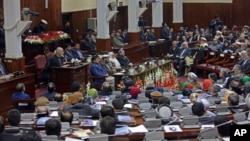Last week, an Afghan warlord in northern Takhar Province stormed the office of a local judge and brutally beat him for allegedly not signing papers that would have given the local commander several acres of illegal land. The judge is reported to have been hospitalized because of the attack.
Afghan President Ashraf Ghani ordered the arrest of the local commander and vowed to put him on a public trail. He made the promise during a meeting with a group of Afghan journalists in the presidential palace on Friday.
He did not disclose the name of the commander, but said he is committed to the independence and protection of the nation's judiciary.
“The judge came to Kabul and I have ordered authorities to have the local commander arrested,” said Ghani. “I want you [journalists] to cooperate with the government in this issue.”
This is not the first time powerful individuals have taken the law into their own hands and ignored the country’s system of justice.
In July, security guards of Nazir Ahmad Ahmadzai, second deputy of the Afghan parliament’s lower house [Wolesi Jirga], attacked journalist Amin Babak and beat him unconscious.
“Unfortunately with the presence of the international community in Afghanistan and its continued support of the Afghan government, we still witness extra judiciary killings, we see powerful people who have no regard for the law whatsoever and do things their own ways,” Babak told VOA.
Babak said Ahmadzai promised to take the necessary legal action against his guards, but then failed to do so.
When contacted by VOA, Ahmadzai said it was a pre-planned political plot against him.
“[Regardless] as a representative of the people, I took the right measures by disarming the guard who engaged him, and referred both parties to the general attorney’s office for legal proceedings, but Babak failed to show up,” said Ahmadzai.
Babak denies Ahmadzai’s claims.
Abuse of power
Abuse of power not only targets civilians, in recent years low-level Afghan government officials also have been targets.
In late 2012, an Afghan police officer was beaten by the guards of lawmaker Haji Zahir Qadir. The incident occurred after a suicide attack in Kabul. The officer was in charge of cordoning off the area for post-blast investigations, but Qadir’s guards forced their way in, prompting the clash. Qadir later on went to visit the police officer at a local hospital and apologized in person.
Also in 2012, pictures of the beating of a traffic policeman by a group of powerful men ended up on Facebook, causing public outrage and the arrest of the offenders.
But this month, Kabul emergency room doctor Mirwais Hemat was beaten by armed men who wanted him to treat their wounded friend. They broke Hemat’s neck and nose. The men were celebrating the anniversary of the death of Ahmad Shah Massoud, a leading northern alliance commander who was assassinated two days before September 11, 2001 by al-Qaida.
Insecurity and lawlessness
Analysts argue that public support for a government is one of the absolutely necessary ingredients for stability in a country, and people support government when all citizens are treated equally and fairly.
Attiqullah Amarkhil, a security expert in Kabul, assigns part of the blame for the country’s instability on abuse by powerful individuals, which he says creates distance between the public and the government.
“As far as respect to the rule of law is concerned, law is broken in a lot of cases in this country by certain elites. There are some powerful people who abuse their power and have armed militias at their disposal. They have no regard for the government. They consider themselves to be above the law,” said Amarkhil.
Lawmaker Asifa Shadab, a member of the law enforcement commission of the Afghan parliament, agreed that law is applicable only to ordinary citizens of the country; powerful elites get away with misdemeanors. But she argued that instability in the country gave birth to lawlessness.
“I cannot deny the fact that the executive, judiciary and legislative branches of the government are to be blamed for failing to fully enforce the law,” said Shadab.
Law enforcement or counterterrorism?
Afghanistan has around 153,000 national police officers, which are primarily for law enforcement responsibilities in the 34 provinces of the country, but because of the ongoing insurgency in the country Afghan National Police have been dragged into counter-insurgency warfare. This has affected the force’s ability to enforce the law and ensure public order.
Security expert Amarkhil says too much is asked of the Afghan police.
“[The] Army has to clear an area of the enemy and insurgents and hand it over to the law enforcement. Police have to maintain public order in the area and enforce the law of the land,” said Amarkhil. “But Afghan police are putting aside their prime task of law enforcement and are pushed to fight terrorism instead.”














